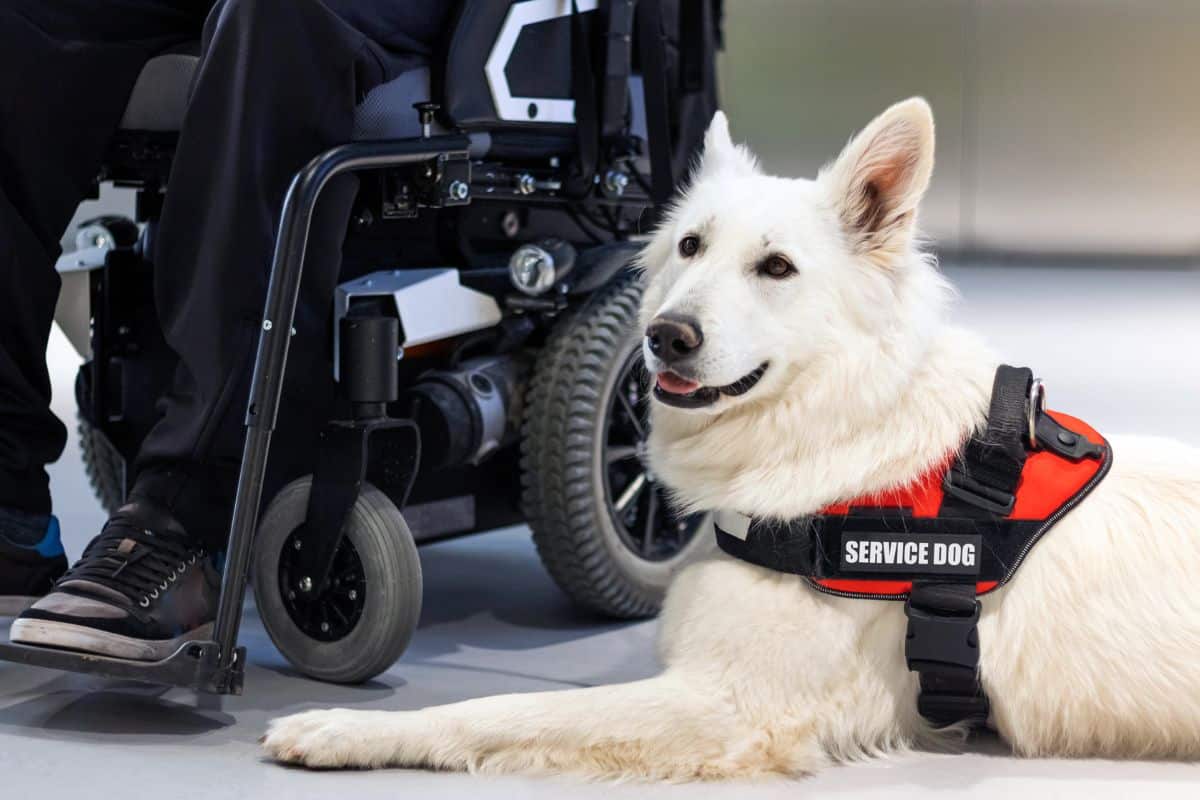Service Dog Training: A Guide to Canine Assistance

Service dog training is a remarkable journey of dedication and teamwork. In this comprehensive guide, we'll explore the world of service dogs, their training requirements, and how to get a service dog.
What is a Service Dog?
Service dogs are extraordinary canine companions that transform lives through their unwavering dedication and specialized training. These remarkable animals aren't just pets; they're highly trained to perform specific tasks that assist individuals with disabilities. Let's delve deeper into what makes a service dog.
Service dogs are recognized for their exceptional abilities to aid individuals with disabilities, such as those with visual impairments, mobility challenges, hearing impairments, and even psychiatric conditions. These dogs provide invaluable support, enhancing the quality of life for their handlers.
Service dogs are incredibly versatile, and there are various types, each tailored to meet specific needs. Guide dogs, for instance, assist the visually impaired by navigating obstacles and providing guidance. Mobility assistance dogs help individuals with limited mobility by retrieving objects, opening doors, or even providing balance support. Psychiatric service dogs offer crucial emotional support and help individuals manage conditions like anxiety or PTSD.
Legal Rights and Protections for Service Dogs and Their Handlers
Service dogs are more than just helpful companions; they come with legal rights and protections. In the United States, the Americans with Disabilities Act (ADA) ensures that individuals with disabilities can be accompanied by their service dogs in public places, such as restaurants, stores, and public transportation. These rights are crucial in providing service dog handlers with the freedom and accessibility they deserve.
Service Dog Requirements
Service dogs are not your average household pets; they possess specific traits and characteristics that make them well-suited for their vital roles. The following are considerations when selecting the right dog to be a service dog.
Behavioral and Temperamental Traits Needed in a Service Dog
The right temperament is crucial for service dogs. They must be calm, obedient, and able to focus on their tasks, even in busy or distracting environments. Patience and a gentle nature are essential when interacting with their handlers, especially in times of stress or crisis.
Physical Health and Fitness Requirements
Service dogs need to be in excellent physical health to perform their tasks effectively. This means being free from chronic health issues that could impede their duties. Regular veterinary check-ups are essential to ensure their well-being.
The Role of Breeding and Genetics in Service Dog Selection
Many service dogs come from specialized breeding programs that focus on producing dogs with the desired temperament, health, and physical attributes. Genetics play a significant role in determining whether a dog is suitable for service work.
How to Make Your Dog a Service Dog
If you have a dog that you believe has the potential to become a service dog, you can embark on a journey to train them for this vital role.
Evaluating Your Dog's Suitability
Before diving into training, it's essential to assess your dog's suitability for service work. Factors such as temperament, behavior, and physical health should be considered. Seek the guidance of a professional trainer or organization like The Academy of Pet Careers for expert advice.
Basic Obedience Training
All service dogs start with basic obedience training. This includes commands like sit, stay, heel, and come. These skills serve as the foundation for more advanced training.
Specialized Task Training
Depending on the type of service dog needed, specialized tasks are taught. For instance, a guide dog learns to navigate obstacles, while a mobility assistance dog might be trained to retrieve dropped items or open doors.
Socialization and Public Access Training
Service dogs must be comfortable in various social situations and public spaces. Socialization helps them adapt to different environments and people. Public access training ensures they behave appropriately when accompanying their handlers in public.
Acquiring Required Certifications and Documentation
Service dogs are NOT required to be certified or have any sort of documentation, nor are service dogs required to wear a vest. There are organizations that claim to “certify” service dogs, but this is not a legal requirement, and no one is allowed to ask for proof or documentation that your dog is a service dog. With that said, it is important that people do not take advantage of these rules and only claim to have a service dog if they have one of the qualifying disabilities and the dog is specifically trained to support the disability.
How to Get a Service Dog
If you're in need of a service dog but don't have a dog suitable for training, there are established avenues to obtain a service dog.
Assessing Your Need for a Service Dog
Before proceeding, it's crucial to assess whether a service dog is the right solution for your needs. Consulting with healthcare professionals can help determine if a service dog would be beneficial.
Choosing the Right Service Dog Program or Organization
There are specialized organizations that can help pair dogs with handlers. It is important to find an organization that specializes in your desired needs and has a good track record of success. Research and choose an organization that aligns with your requirements and values.
The Application and Evaluation Process
Organizations typically have an application process that involves assessing your needs and compatibility with a service dog. They may also evaluate your living situation and ability to care for the dog. Not every situation is suitable for a service dog.
Costs and Funding Options for Obtaining a Service Dog
Service dogs can be a significant investment, anywhere from $10,000 to $50,000 for a trained dog. Costs can vary depending on the organization and the level of training the dog has received. Some organizations offer financial assistance or fundraising support to help cover expenses, but these programs can be highly competitive.
How to Become a Service Dog Trainer
Becoming a service dog trainer is a fulfilling career path, but it requires dedication and education.
Education and Training Requirements
Start by pursuing formal education and training in dog behavior and training techniques. Programs like the Specialized Dog Training program offered by The Academy of Pet Careers can provide the skills needed to work as a service dog trainer.
Gaining Practical Experience
Working with experienced trainers and handling a variety of dogs is essential to becoming proficient in service dog training. Apprenticeships and internships can provide invaluable hands-on experience.
Certification
Consider obtaining certification from reputable organizations that specialize in service dog training like The Academy of Pet Careers. Certification is not a requirement to train service dogs but can enhance your credibility as a trainer.
Ethical Considerations in Service Dog Training
Service dog trainers must prioritize the welfare of both the dogs and their handlers. Ethical training practices, respect for individual needs, and a commitment to positive reinforcement are essential principles.
Service dog training is a remarkable journey of compassion and skill. Whether you're seeking a service dog, considering training one, or aspire to become a service dog trainer, the road ahead is filled with opportunities to make a profound difference in the lives of individuals with disabilities. Remember, with the right guidance and dedication, you can be part of this incredible world of service dogs.
 Author - Joseph Schifano
Author - Joseph Schifano
Joseph Schifano is the owner and President of The Academy of Pet Careers. With over 20 years of experience working in the pet field, managing large scale pet care businesses, he has experience in every facet of the industry. Joseph's focus is primarily on the business of pet care but his passion is in understanding animal behavior how a dog's brain works so we can improve the care we provide as pet professionals. He is a huge advocate for Pet Empowerment and Force Free training methods. Read more in Joseph's full bio.
